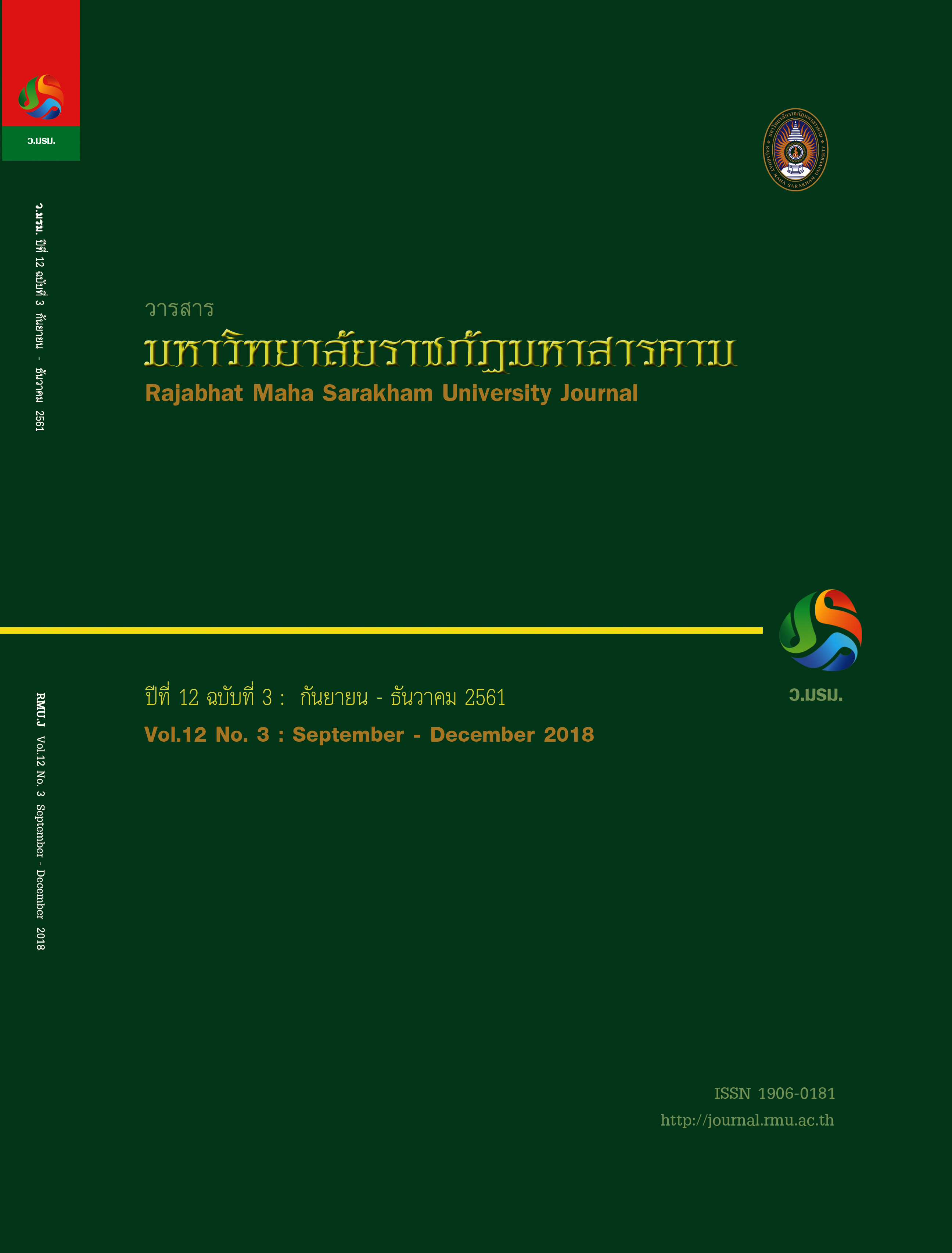การพัฒนากระบวนการวิจัยและเสริมสร้างการคิดไตร่ตรองด้านศาสตร์การสอนของนักศึกษาครู
Main Article Content
บทคัดย่อ
การวิจัยครั้งนี้มีวัตถุประสงค์เพื่อการพัฒนากระบวนการวิจัยและเสริมสร้างการคิดไตร่ตรองด้านศาสตร์การสอนของนักศึกษาครูมหาวิทยาลัยราชภัฏมหาสารคาม โดยบูรการกระบวนกานนิเทศผ่านสื่อออนไลน์ กลุ่มผู้มีส่วนร่วมในการวิจัยเป็นนักศึกษาครูชั้นปีที่ 5 คน จากสาขาวิชาวิทยาศาสตร์ เคมี ฟิสิกส์ ชีววิทยา และคอมพิวเตอร์ศึกษา จำนวน 44 คน ที่ลงทะเบียนเรียนวิชาการปฏิบัติการสอนในสถานศึกษา1 ตามหลักสูตรครุศาสตรบัณฑิตภาคเรียนที่ 1 ปีการศึกษา 2559 เครื่องมือที่ใช้ในการวิจัย ได้แก่ ชุดกิจกรรมเตรียมความพร้อมความรู้พื้นฐานการพัฒนากระบวนการวิจัยและเสริมสร้างการคิดไตร่ตรองด้านศาสตร์การสอนแบ่งออกเป็น 3 หน่วยคือหน่วยที่ 1 ทักษะการใช้สื่อออนไลน์ (เวิร์ลไวเว็บ.เอ็ดโมโด) หน่วยที่ 2 ความรู้พื้นฐานการคิดไตร่ตรองด้านศาสตร์การสอน และ หน่วยที่ 3 ความรู้พื้นฐานด้านกระบวนการวิจัยในชั้นเรียน และเครื่องมือที่ใช้ในเก็บรวบรวมข้อมูลได้แก่ 1) แบบประเมินความสามารถด้านกระบวนการวิจัย 2) แบบประเมินความสามารถการคิดไตร่ตรองด้านศาสตร์การสอนของนักศึกษาครู 3) แบบประเมินทักษะการคิดอย่างมีวิจารณญาณในการสืบค้นข้อมูล 4) แบบประเมินความสามารถการรู้คิด และ 5) แบบสอบถามเจตคติต่อกระบวนการวิจัยการวิเคราะห์ข้อมูลเชิงปริมาณด้วยร้อยละ ค่าเฉลี่ย ส่วนเบี่ยงเบนมาตรฐาน และt-test Dependent Sample) และการวิเคราะห์เชิงคุณภาพโดยเขียนบรรยายประกอบความเรียง (Content Analysis) ผลการวิจัยพบว่า 1)นักศึกษาครูมีความสามารถด้านกระบวนการวิจัยหลังการใช้การทำกิจกรรมนิเทศโดยใช้สื่อออนไลน์สูงขึ้นกว่าก่อนการใช้อย่างมีนัยสำคัญทางสถิติที่ระดับ 0.1 2) มีความสามารถการคิดไตร่ตรองด้านศาสตร์การสอน ส่วนใหญ่อยู่ระดับเทคนิค (technical level) คิดเป็นร้อยละ 72.73 รองลงมาคือ ระดับอิงบริบทแวดล้อม(Contextlevel) คิดเป็นร้อยละ 27.27 แต่ไม่พบความสามารถการคิดไตร่ตรองในระดับการใช้หลักคุณธรรมและจริยธรรม(Dialecticallevel)3) มีความสามารถการคิดอย่างมีวิจารณญาณในการสืบค้นข้อมูลเฉลี่ยโดยรวมอยู่ในระดับมาก 4) ความสามารถการรู้คิดหลังสิ้นสุดการทำกิจกรรมการเรียนรู้ตามภาวะงานที่ 3 สูงขึ้นกว่าค่าเฉลี่ยภาระงานที่ 1 อย่างมีนัยสำคัญทางสถิติที่ระดับ .01และ 5) มีเจตคติต่อกระบวนการวิจัยโดยรวมอยู่ในระดับมาก
Article Details

อนุญาตภายใต้เงื่อนไข Creative Commons Attribution-NonCommercial-NoDerivatives 4.0 International License.
1. บทความที่ลงตีพิมพ์ทุกเรื่องได้รับการตรวจทางวิชาการโดยผู้ประเมินอิสระ ผู้ทรงคุณวุฒิ (Peer Review) สาขาที่เกี่ยวข้อง อย่างน้อย 3 ท่าน ในรูปแบบ Double blind review
2. ข้อคิดเห็นใด ๆ ของบทความที่ลงตีพิมพ์ในวารสารมหาวิทยาลัยราชภัฏมหาสารคาม นี้เป็นของผู้เขียน คณะผู้จัดทำวารสารไม่จำเป็นต้องเห็นด้วย
3. กองบรรณาธิการวารสารมหาวิทยาลัยราชภัฏมหาสารคาม ไม่สงวนสิทธิ์การคัดลอกแต่ให้อ้างอิงแสดงที่มา
เอกสารอ้างอิง
danaisakKumrai. (2014). “The Use of Web 2.0 Tools in Giving Consultation to Students of Teaching Internship,”Journal of Education Burapha Univeresity.Vol 25(1) : 30-36 ; January-April.
BunchongAmornchiwin. (2013). Critical Thginking. Edit 1st. Bangkok :PappimLtc.
BoonchomSrisaard. (2002). Primary Research. Edit7th. Bangkok:SuwiriyaSarn.
Prawit Simmatun(2010). Evaluation of Developed Collaborative Learning Instructional Model via Computer Network Based on Constructivist Theory.Docteral Thesis of Education (Ph.D.)in Computer Education ;Graduate School, Technology PrachomKlao North PranakornUniversity.Bangkok.
Tippawan Srichun et al., (2003). Thinking and Decision Making.BangkokThe Book Centure Project, Rajabath InstituteSuanDusit.
Tisana Khammani. et al., (2001). Thinking Science..Bangkok:The Master Group Management Limited..
Taggart, L. G. and Wilson, P. A. (2005). Promoting Reflective Thinking in Teachers: 50 Action Strategies . (2 nd ed.) California : Corwin Press, Inc.
Farrell, Thomas,S.C. (2004). Reflective Practice in action : 80 Reflection Breaks for Busy Teachers. Thounsand Oaks, Califonia, Crowin Press.
Sompong Srikunlaya et al.,(2013). Development of Critical Thinking Skills.in DataAnalysis,and Synthesisof Pre-service Teachers..Students. Faculty of Education, RajabhatMahaSarakham University. Muang District, Maha Sarakham Province.
Samarn Ekkapimet al.,(2014). The Development Process of Research Through the Integration with Critical ThinkingSkills and Metacognition Among Pre-service Students, Faculty of Education RajabhatMahaSarakham Univesity. Muang District, Maha Sarakham Province.
Papanastasiou, E. C.(2005). “ F ACTOR STRUCTURE OF THE ATTITUDES TOWARD RESEARCH SCALE ,”Statistics Research Journal, 4(1),16-26.
Henderson, J.G. (1992). Reflective Teaching :Becoming an Inquiry Education.New York : Macmillan Publishing.
Luan Saiyote and AngkanaSaiyote. (2000). Measurement and Evaluation Techniqes. Ed 2nd. Bangkok : SuwiriyaSarn.
Lukana Siriwat. (2006). Thinking. Bangkok : Odient Store Depertment.
Shon, A.D. (1987). Educating the Reflective Practitioner: Toward a New Design for Teaching and Learning in the Professions.San Francisco, Carifornia. Jossey-Bass Inc.
Shon, A.D. (1983). The ReflectivePractitioner : How Professionals Think in Action. New York. Basic Books, Inc.
Wareerat Kaewurai. (1998). The Development of the Instructional Model for General Methods of Teaching Subject Emphasizing Cases to Enhance Teacher Students’ Reflective Thinking Ability in the Science of Teaching.Docteral Thesis of Educationin Curriculum and Instruction ; Graduate School, Chulalongkorn University.
Dewey, J. (1933). How We Think : A Restatement of the Reflective Thinking to the Educational Process. Boston. D.C. Heath and Company.
Sparks-Langer, G.M. & Colton, A.B. (1991). Synthesis of Research on Teachers Reflective Thinking. Educational Leadership, 48(6), 37-44.
Wancharee Mungsing. (1993). “Reflective Thinking : New approach in Teacher Eduction,”.Journal of Education Khonkaen Univeresity. 16(2) : 31-34 ; June-September.
Laboskey. (1994). Development of Reflective Practice A study of Pre -service Teachers. New York and London.
Henter, I. (2012). “ Metacognitive Training for Awareness of Reading Strategies,” in International Conference of Scientific Paper Afases 2012. Faculty of Psychology and Educational Sciences, “Transilvania” University of Brasov, Romania.
Ming-Huey Tseng. (2008). “ Data-Driven Problem Solving and Students’ Critical Thinking in a Problem-Based Learning Environment,” in ProQuest. (Northern Illinois University)
Ong-Art Naiyaputh. (2008). Research Methodology for Behavioral and Social Sciences. Ed 3rd.: Bangkok : Samlada..


